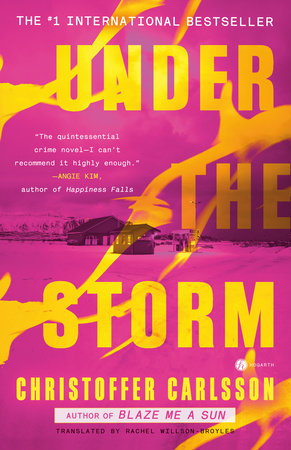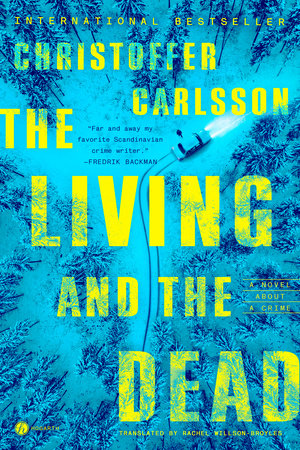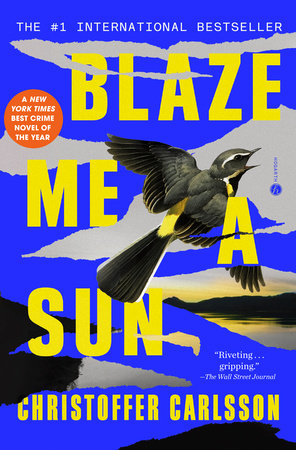Excerpt
Under the Storm
1They say death takes you. It’s an old expression, from the time back when death was an actual character you could meet in the Marbäck forest or along the road. An ice-cold hand grabs you by the throat; a shadow expands around your body until you can no longer breathe. That’s how you picture it when you’re a child.
People say other things, too. There’s this word, used by old men and women around here. It comes across their lips like sinister smoke when someone is a little mean or nasty, when a place or thing has this unpleasant, uncanny feel to it: kymig.
He’s kymig, that one. Never liked him.
Don’t go there. That house feels so kymig.
I did something kymigt tonight.
That’s what people say. And, if you were to suddenly find yourself in some kind of danger, it’s not I don’t know what to do but I don’t know where to put myself. As if your first instinct is to hide.
Tonight, the flames are reaching for the sky. The weather forecast calls for a downpour, but not a drop of rain is falling. Everything is covered with soot and ash, and the big trees are getting singed. The smell of smoke drifts all the way up to Simlångsdalen, and into Skedala, over a mile away.
It’s an event people will remember, a reference point. It creates a before and an after.
Where were you when . . .
Was that before or after . . .
Down in Tolarp, the houses and farms are far apart. Closest to the Markströms’ house is Ulrika Antonsson’s farm. A big field separates their properties. Ulrika is the one who calls it in.
“There’s a fire,” she shouts into the phone. “The Markströms’ house is f***ing burning down! Send the fire department, the police, and ambulance, everything, fast as hell.”
She walks out into the November night and captures the fire in a photo. She’s not the only one to do so. Later they’ll get requests from the newspapers: The local paper’s photographers don’t arrive until the fire department has begun to fight the flames, so their pictures don’t turn out. Almost everyone refuses the offers, but Ulrika needs the money and secretly sells her amateur photos for a handsome price. Soon they’re everywhere. Her name is never mentioned in connection with them—they’re credited only as “reader photographs”—but everyone knows.
Great tongues of flame lick at the black night. The Markströms’ brown house is an old one-story wood-frame home, with small windows and a flat roof. The house has a woodstove and a gas oven, bad wiring and old electrics; its insulation is dry as a bone. Previously, these sorts of details weren’t widely known, but soon everyone is aware of them. If there’s anything people learn in the days following the Tolarp disaster, it’s that just about anything can set a house on fire.
Not everyone wakes up. Little Isak Nyqvist up on Svanåsvägen is fast asleep. His best friend, Theo Bengtsson, is too. Two miles away, in Officer Vidar Jörgensson’s front hall, Leo is pacing. The racket he’s making forces Vidar up to the surface until he opens his eyes and places the soles of his feet on the chilly floor.
The Labrador is waiting at the front door and barking like he hears an intruder.
“What’s wrong with you?” Vidar yawns. “There’s no one here.”
He opens the door. The dog peers out. The November air is ice-cold. Then Vidar smells it, too. When he walks onto the lawn he can even see the fire: At this distance it’s nothing but a glow, an orange dome rising over the tops of the fir trees.
“I see,” he says. “Good boy, Leo. Thanks for barking.” Leo shakes himself off and gazes at Vidar with big brown eyes.
“Well, let’s see.” Standing in the frosty grass, Vidar tries to guess how far away the fire is. “Yes, maybe. I’ll have to check.”
He goes back inside, gets dressed, and slips his feet into his heavy boots. He presses his lips to Leo’s soft head and gives him a quick scratch behind the ear, and then he takes off.
But he doesn’t have his uniform. He’s been wearing it for four years, and in that time he’s seen a lot. The uniform is important that way; it’s a shield. Or armor. The things you encounter stay within it.
Not everything, obviously. Sometimes you see the sorts of things even the uniform can’t protect you from.
Vidar walks along old paths edged by tall forest and open fields, small farms and houses. A little village seven miles east of Halmstad—that’s Marbäck. Those who grow up here are told they belong to a fortunate few. It’s probably true. Disaster seldom visits here.
The stink of the fire grows worse. The glowing dome expands. In the distance, sirens blare.
He passes the Marbäck farmstead and turns, heading over the small bridge and down to the area known as Tolarp.
There it is, roaring in the night, the Markströms’ house, ablaze. His eyes sting. The fire department and ambulance have arrived; so have Vidar’s colleagues. His heart beats faster and faster as he approaches the blue-and-white police tape. The incident commander, a stocky fireman whose name Vidar can’t remember, is talking to the ambulance crew.
“Is there anyone inside?” Vidar asks.
“It’s hard to get in, so we don’t know. But we don’t think so. The house is engulfed, so all we can do now is let it burn.”
“Is there anything I can do?”
“You’re a police officer, right?”
Vidar nods. “I live out here.”
The incident commander looks at the fire. Flames like living beings. “Help out wherever you can. Just stay away from the fire.”
Vidar makes his way to the ambulance and borrows an extra jacket. Over by one of the blue-and-white patrol cars, a colleague gives him a pen and notebook. In the glow of the flames he helps keep order, making sure the cordon isn’t breached and talking to the neighbors. Almost everyone is outdoors and looking in the same direction, seeing the same thing.
Ulrika Antonsson’s property is to the southwest. They’ve already spoken to her. To the north is Josefina Fransson’s farm. She bought it, livestock and all, from her elderly father a few years before he died. For the price of one thousand kronor. A symbolic amount. She’s fifteen or twenty years older than Vidar, but he’s always liked the look of her. Her mass of hair is shot through with gray, but her skin is almost smooth. She’s wearing jeans and an unbuttoned shirt knotted at her waist over a dark tank top that hides her heavy breasts. Those are his weak point, really. He’s aware of it, but there are certain things a person can’t quite help.
“I saw Lovisa come home on her bike,” Josefina says. “I think it was around five, maybe. You know, she works at Brooktorpsgården in town now, so she usually bikes to the bus stop and then back home again in the afternoon.”
All that’s left of the bike is a sooty frame.
“Did you see her after that?”
Josefina shakes her head.
“But her mom and dad took off later. I guess someone was turning fifty, so they’re at a party.”
“So Lovisa was at home?”
“I . . . I think so. But I don’t know for sure. I haven’t seen her since she got home.”
Vidar’s back is to the fire, but he can still see it. The flames are reflected in Josefina’s shiny eyes.
When he walks along the border created by the police tape, he stops short. There, in the grass, is a work glove. He turns toward the house. The flames aren’t as vigorous now, but they never made it over this way. Vidar runs his hand over the frozen grass. It’s untouched.
Vidar raises his arm and calls a colleague over.
“Uh-oh,” he says.
“Yeah,” says Vidar.
“I’ll get a marker. Will you stay here?”
Vidar stays put. It’s cold without his uniform on. His colleague returns with a numbered marker and carefully pokes it into the ground.
The glove has clearly been singed by the fire. At close range, you can also see the flecks of blood.
It takes some time for the chief inspector to arrive, but suddenly there he is, at the center of the action, leaning over a floor plan someone managed to obtain on the spur of the moment. That’s the kind of guy he is. Chief Inspector K-G Öberg is a large man, dressed like a woodsman in heavy boots, a knitted sweater, and pants with many pockets. He’s a good boss with a strong voice. His hair is thin and gray, his face round and puffy. His eyes, as they gaze down on Vidar, are candid, warm. Despite his size he can move without making a sound—you seldom hear him coming.
“Young Jörgensson,” he says, surprised. “Damn it, that’s right—you live out here.”






